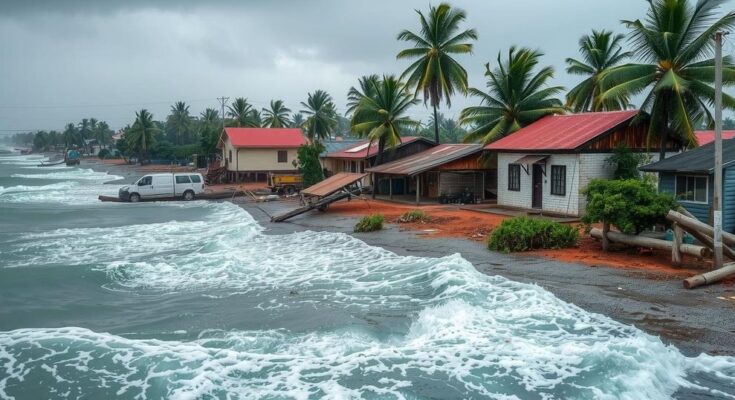Cyclone Chido has caused significant destruction in northern Mozambique, with 120 fatalities and over 680,000 people affected. Most damage occurred in Cabo Delgado, Nampula, and Niassa provinces, with thousands of homes destroyed. The Mozambican government is providing emergency shelter for some displaced individuals while international organizations are calling for support to aid recovery efforts.
The recent devastation caused by Cyclone Chido in northern Mozambique has resulted in a tragic death toll of 120 individuals, with 868 others injured and over 680,000 affected overall. This powerful cyclone swept through the northern provinces—including Cabo Delgado, Nampula, and Niassa—bringing torrential rains and causing extensive flooding. The destruction is particularly alarming, with reports indicating that over 140,000 homes were either partially or completely destroyed.
Cyclone Chido made landfall on December 15 after initially forming over the southwestern Indian Ocean on December 5. Its wrath has left approximately 123,000 families impacted, alongside significant destruction to the educational and healthcare infrastructures, with at least 250 schools and 52 health facilities reported damaged. The local government has responded by establishing two emergency shelters that are currently accommodating 1,349 displaced individuals, as per recent reports by the Xinhua news agency.
Natural calamities of this magnitude underscore the vulnerabilities of communities and infrastructures against climate change. The National Institute for Disaster Risk Management and Reduction (INGD) highlighted these concerns in a recent social media post. Authorities and humanitarian organizations continue to appeal for urgent assistance to address the immediate needs of those affected and facilitate the recovery process.
Cyclone Chido emerged as a significant threat, following a pattern of severe weather events in the region, exacerbated by climate change implications. Tropical cyclones form from low-pressure weather systems and can significantly intensify, causing widespread devastation. Mozambique has a history of facing similar disasters, making it imperative for the government to implement robust disaster management strategies. The impact of Cyclone Chido is a stark reminder of the urgent need for resilient infrastructure and preparedness against future climatic challenges.
In summary, Cyclone Chido has wrought havoc in northern Mozambique, with over 120 fatalities and many more injured. The cyclone’s impact has been devastating, particularly in terms of housing, education, and health facilities. As humanitarian efforts ramp up in response to this crisis, there remains a pressing need for sustainable strategies to combat the ongoing threats posed by climate-related events. The tragedy serves to emphasize the vulnerability of local communities and the necessity for comprehensive disaster preparedness measures.
Original Source: english.mathrubhumi.com




